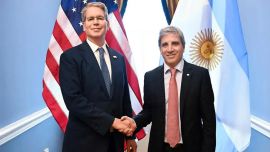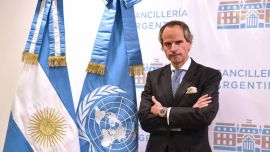In the week in which former president Mauricio Macri has launched his new book, Primer Tiempo, the government’s election strategy is increasingly to single him out as its main target, an approach reinforced by opinion polls showing that voters vividly remember the economic crisis accompanying his presidency.
The government welcomes the fact that Macri is hogging the opposition scene and that the hard-line wing of the Juntos por el Cambio coalition is gaining ground. For the Alberto Fernández administration, the strategy is clear – even if the ex-president is not a candidate, he must be injected into the electoral fray.
Contrasting the economic crisis actively remembered by the voters (according to the opinion polls) with the recovery following the pandemic collapse will be the basis for competing in these elections. But the economy will not be the only focus – all officials will have to hone in against the figure of Macri.
Fernández had anticipated this in his state-of-the-nation speech inaugurating Congress and Vice-President Cristina Fernández de Kirchner deepened the dispute a few days later in court. The target is the former president and his reappearance, thanks to the publication of his book, will be exploited by the government.
The president announced a “criminal lawsuit” on March 1. He is seeking to identify the authors and participants in the debt of US$57 billion assumed by the Cambiemos government, which Fernández described as “the most fraudulent administration and the biggest embezzlement of funds which our memory registers.”
Next day the vice-president said that the water was up to the government’s throat because of this debt, which was, for example, why bigger pension increases were not possible.
It was the Anti-Corruption Office (OA), under the leadership of Félix Crous, which presented the criminal lawsuit against the ex-president and various officials of his government for “fraud, aggravated malfeasance and embezzlement of public funds,” based on reports submitted by the Central Bank and the Comptrollers (SiGen) auditors. Apart from Macri, former government ministers Nicolás Dujovne (Treasury) and Luis Caputo (Finance) and former Central Bank governors Federico Sturzenegger and Guido Sandleris were also charged.
According to the denunciation, with those International Money Fund loans, the officials of the previous government “executed a criminal programme destined to generate huge final dollar profits for individuals and legal entities, which were financed via the foreign debt contracted by the state.”
In the view of this government, the ex-president and his officials must render explanations for the economic crisis which they left, thus recalling and keeping fresh the numbers of his administration. The income tax reform raising its floor to gross salaries of 150,000 pesos and exempting the midyear and Christmas bonuses from the levy also takes the battle to Macri. The ex-president’s 2015 campaign promise to eliminate it will be recalled but “he did not lower or eliminate it, he doubled it from 1.2 million people in 2015 to 2.4 million in 2019.” A message to the middle class which votes looking at the economy.
They also aim at other areas in this direction. The Interior Ministry under Eduardo “Wado” De Pedro is the most active in showing up differences. Last weekend the National Immigration Department expelled John Paul Revilla Estada, convicted in 2015 for heading one of the most dangerous drug-trafficking organisations in the country. This was a message to the Macri administration which released him for deportation to Peru in 2017 on the grounds that he was homesick after serving only half his term. Soon afterwards, he made a clandestine return to Argentina, violating the ban on his re-entry.
“If he had not been released and expelled in 2017, he’d still be behind bars serving his sentence in Argentina,” reported the Interior Ministry, which only a week earlier revoked a Macri-era immigration decree which accelerated trials to the point of being sternly questioned by the United Nations.
Earlier this month, De Pedro’s portfolio decided to revoke three decrees signed by the former president permitting advance voting by Argentines abroad, convicts and federal security forces supervising the elections. These norms had been established in the electoral year of 2019 by the Cambiemos government, without passing through Congress.
In the same week the ministry advanced with harsh denunciations of the Macri administration for crimes like illegal espionage, the lack of protection for personal data, contacts with the Chinese mafia and the sale of residency permits.
Another portfolio which is becoming a campaign protagonist is the Public Works Ministry, led by Gabriel Katopodis. They are not only highlighting the contrast with the paralysis in that area after 2017, they are also gunning against an alleged misallocation of funds since this portfolio was the first to present itself as a plaintiff in the highway tolls case investigating a fraud of over US$1 billion in the renewal of the concession of the northern and western access routes to former partners of Macri.
The opinion polls come from Buenos Aires Province, whose mayors repeat to Alberto Fernández that their voters still reject the previous government. It will all work out, if the vaccines against coronavirus arrive, and if the “VIP vaccine” scandal passes into history.





















Comments